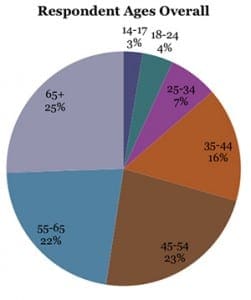Atlanta
Archdiocese receives ‘huge response’ to pastoral planning survey
By NICHOLE GOLDEN, Staff Writer | Published May 1, 2014
ATLANTA—The response to the Archdiocese of Atlanta’s pastoral plan survey, which will help guide the direction of the church locally, is being described as overwhelming.
The archdiocese received more than 14,700 responses to the survey conducted in March both online and in paper format.
According to Peter Faletti, director of planning and research for the archdiocese, the number of responses received is nearly three times higher than those for the family life survey requested by the Vatican in December.
“The sample size needed to generate a representative sample for the entire archdiocese with a confidence level of 99 percent is only 665, a level far exceeded by the total surveys received,” noted Faletti in a memo to pastors.
“This is a huge response. Obviously people want to be heard,” said Faletti in comments to The Georgia Bulletin.
The survey, collecting people’s opinions on key areas of their faith lives, was available in English, Spanish, Vietnamese, Korean, Portuguese and French. Responses were received in all languages. However, statistically, 88 percent of the responses received were in English, and 12 percent were in Spanish.
Over 1,000 people requested and sent in their responses on paper, rather than the online format.
Women made up nearly 65 percent of those who answered the survey. Respondents ranged in age from 14 to over 65. Statistically,
- 3 percent were 14-17 years old
- 4 percent were 18-24 years old
- 7 percent were 25-34 years old
- 16 percent were 35-44 years old
- 23 percent were 45-54 years old
- 22 percent were 55-64 years old
- 25 percent were 65 or older.
Sixty-eight percent of the respondents said they were married. The marital status of 15 percent of respondents, the next highest percentage, was single, never married. Six percent of those answering the survey were divorced, 4 percent were remarried and 1 percent separated. Six percent of those answering the survey said they were widowed.
Jenny Scheb, planning analyst with the archdiocesan Office of Planning and Research, said one of the more striking demographic details is the low response from those 14 to 24 years old.
“We definitely need to find a way to engage the youth across the archdiocese as they have the lowest number of respondents,” said Scheb.
Scheb said that not all parishes track language spoken or other identifying information of parishioners so it’s difficult to have conclusive data on if the respondents mirror the make-up of the archdiocese on the whole.
“However, 70 percent of respondents identified as non-Hispanic white,” said Scheb. “We estimate a much more diverse population in the archdiocese and will ask the clergy and deanery level meeting delegates to consider their entire parish population when proposing recommendations.”
The questions covered spiritual needs, how well believers know the faith, and how it is lived.
In his pastoral letter of March 8, Archbishop Wilton D. Gregory invited all “active, inactive and former Catholics” to respond to the survey that would help identify key issues that would become the focus of an emerging archdiocesan pastoral plan.
Every survey had an opportunity for people to write comments on it after basic questions were answered. The archdiocese’s planning department pulled together a team of people to look at all the comments and from them draw valuable information.
The next step is for the planning department to report on what the critical or key pastoral issues appear to be for the people based on the survey and comments.
“Because of the way we structured the survey we will be able to provide every parish with a summary of their parish response so they can see what their own parish is saying,” said Faletti.
These parish-level summaries will be completed in mid-May without identifying individual respondents, but providing the number who responded and statistics and key themes.
Faletti said during the summer every parish would review the key issues from the survey and apply the wisdom of that individual community to find ways to respond pastorally on each issue.
As the process continues, parish responses will be gathered in each of the 10 deaneries. In September, the Convocation of Priests will devote its meeting to the issues and priests’ assessment of how to respond pastorally.
By year’s end, the archbishop will select recommendations to implement with the goal of welcoming people back to the church and re-energizing the faithful.
Implementation of the official pastoral plan is slated for January 2015.
The next issue of The Georgia Bulletin will include an article on the key pastoral issues that people have raised through the survey, as well as an article on the next steps in the process.